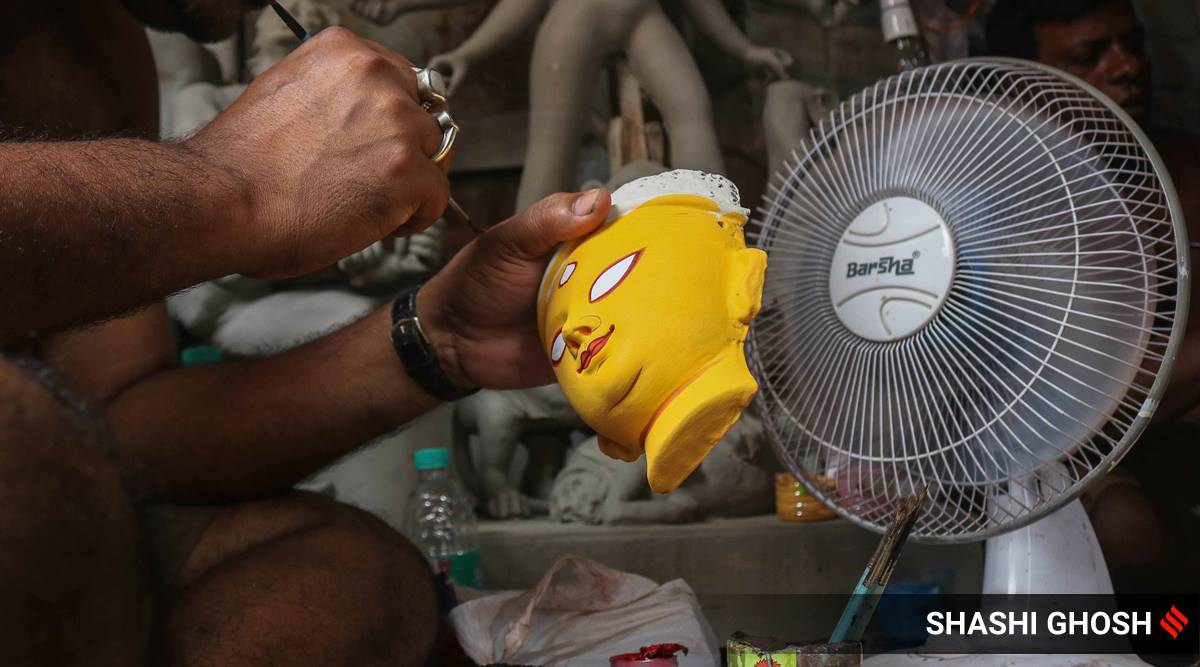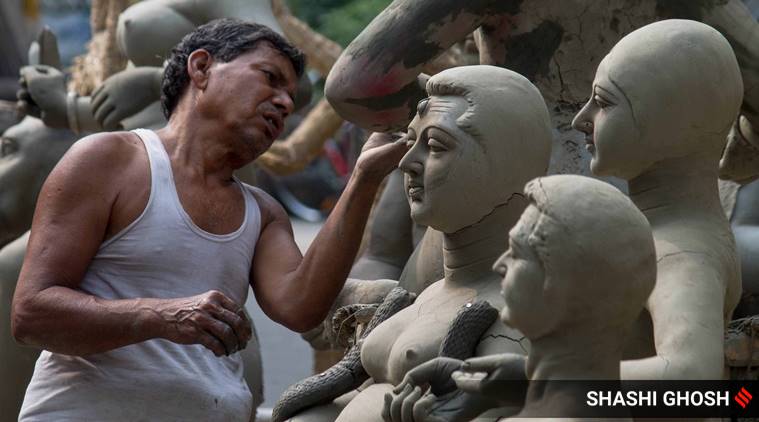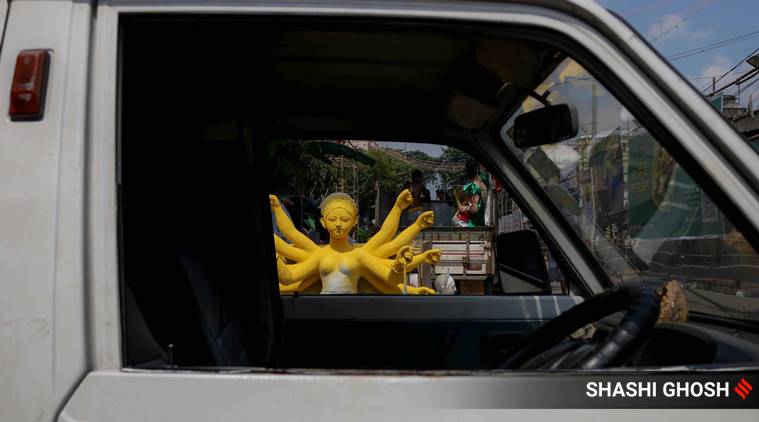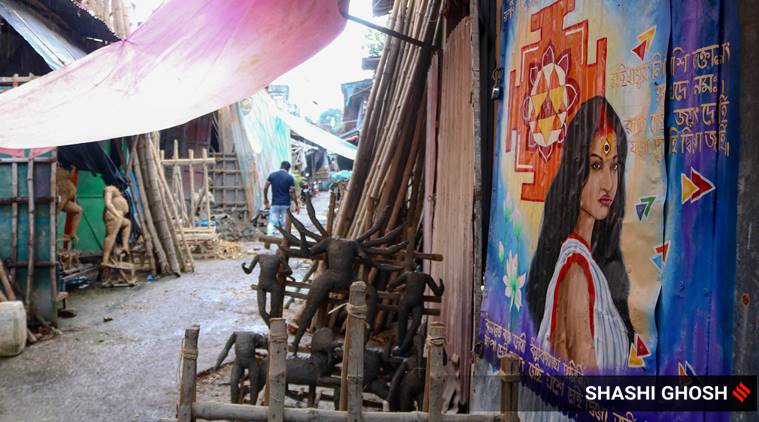Having been hit by Cyclone Amphan in the middle of the coronavirus pandemic in May this year, the scenario now is unlike any other the artisans of Kumartuli have ever seen.
In other circumstances, during this time of the year, the bylanes of north Kolkata potters’ village, Kumartuli, would be bustling with crowds, photographers and tourists, hoping to catch a glimpse of artisans putting final touches to the idols of deities in time for the autumn festival of Durga Puja.
Having been hit by Cyclone Amphan in the middle of the coronavirus pandemic in May this year, the scenario now is unlike any other the artisans of Kumartuli have ever seen.
Most artisans work in semi-permanent structures, propped up using bricks, bamboo and plastic sheets, and the storm that the cyclone brought, wreaked havoc in the neighbourhood, residents said. “Most of us suffered losses because we only hang a plastic sheet and work beneath it. The roof of my home was blown away,” said Kakoli Pal, 42, one of the few women artisans working in Kumartuli.
The process of idol-making begins months before Durga Puja and Pal had just gotten started when the cyclone arrived. “In the storm, the clay melted off three of the idols I had made. I suffered financial losses because I had to pay for the labour that had gone into making these idols. I had to pay the workers despite the damage to the idols,” said Pal.
Only steps away, it is a similar story in Mala Pal’s workshop. “When Amphan hit, the tin of the roof blew off and the bigger idols were damaged. During the lockdown, I didn’t get any orders and some of the boys who work in my shop who had left, have just returned from their villages,” she said.
For approximately two and a half months during the lockdown, Mala Pal didn’t work on a single idol, a first in her two-decade career as idol-maker. Prior to the coronavirus outbreak, Mala would make approximately 42 small and large idols in one season, ranging from 10 feet in height to as small as two feet. This year, however, she has been forced to cut down on that number drastically. “I only have orders for three big idols. I am mostly doing smaller idols this year.”
“Everyone in Kumartuli is facing a similar situation. The costs of the raw materials have increased following the lockdown and the prices of the idols have also increased. But customers don’t want to spend that much money,” she said.
Last year, Kakoli Pal got orders for 10 idols, but this year, only six have come in. “People are also making smaller pandals. Some families who have been coming to me for years, did come by, but this year, I couldn’t send any idols abroad,” she said. “I only sent one to Basirhat (a city two hours away from Kolkata), but that’s about it.”
Ashit Pal, another artisan whose family has been working in Kumartuli for generations, has been struggling to find raw materials to make the idols despite the lockdown having been eased weeks ago. “Materials like clay and rope are very expensive this year and cost twice as much. But at least the workers have started returning from the villages,” he said. “I used to make idols that were 12 feet in height. Now I’m only making those that are six to seven feet in height.
For years, in the run-up to the festive season, Ashit Pal would make approximately 20 idols, but this year, the number has come down by half. “Customers aren’t coming and it’s very expensive to transport the idols and to pay labour to deliver them to the districts.”
However, fewer customers is only the most visible part of the story. “It’s also a risky business because I am afraid of investing in making idols, only for customers to back out at the last minute,” said Ashit. For the artisans of Kumatuli, the investment is much greater than the financial returns. The process of idol-making is labour-intensive, requiring artisans to spend long hours twisting bamboo and straw into the right shape and repeatedly packing and smoothing clay onto the bamboo-straw structure to give the idols their distinct shape and form.
Costs that are sometimes inconspicuous to customers include payments that the artisans need to make to the many workers and assistants they employ under them and to suppliers from whom they purchase raw materials, as well as people who are specially trained to move and transport these large, heavy idols to the customers’ home intact.
According to Kakoli Pal, there have been no reports of any artisans in their small neighbourhood of having been infected by coronavirus. For weeks, no orders meant that artisans were keeping to themselves, but many now fear that customers, who have started coming in, may bring the infection with them. “This is our livelihood. We are blessed by the goddess so there were no COVID-19 cases. But now people are coming in large numbers and there are crowds. So we are a bit afraid,” she said.
During previous years, weeks before the festival was scheduled to start, artisans would struggle to find time to be with their families, and to even eat and sleep, busy making idols round the clock and tending to the steady stream of customers. This year, they’ve been able to do all of these things for which they never found time, but the development has been one that has been unwelcome. It has also come in a form that the artisans do not appreciate—at the cost of their income.
“Pujo doesn’t happen for entertainment. It happens for faith,” said Ashit, acknowledging that for many, the festival will be celebrated differently this year, perhaps with less pomp and circumstance. “But then losses are a part of life.”
? The Indian Express is now on Telegram. Click here to join our channel (@indianexpress) and stay updated with the latest headlines
For all the latest Kolkata News, download Indian Express App.
Source: Read Full Article






